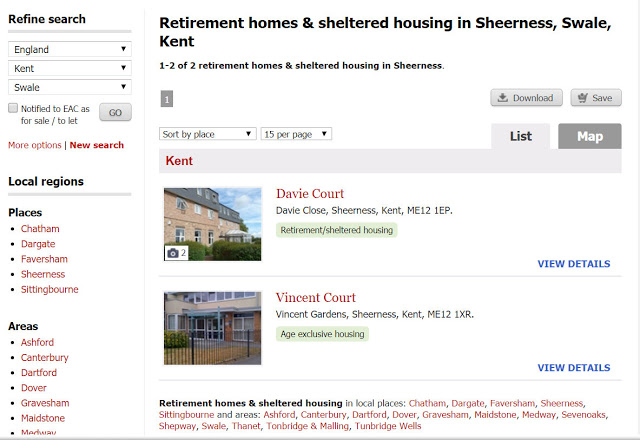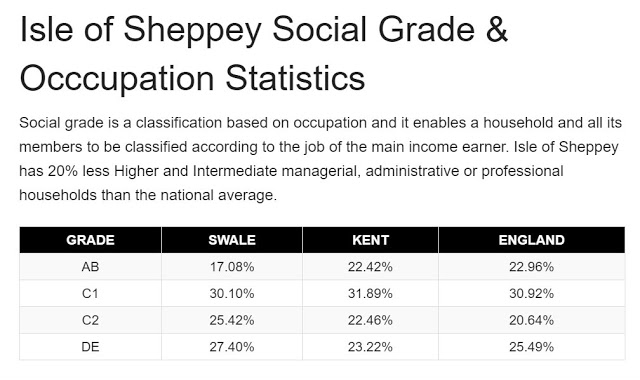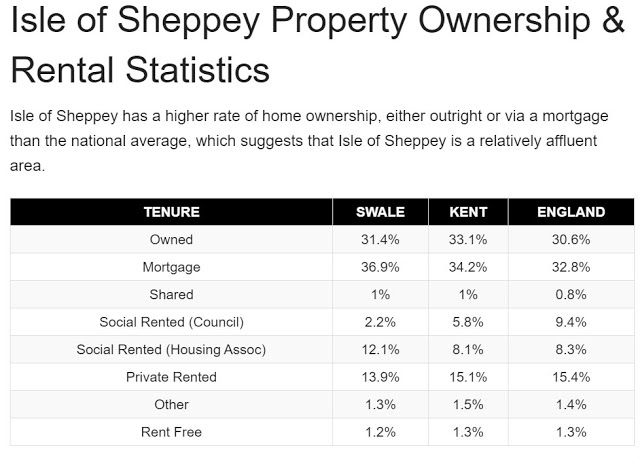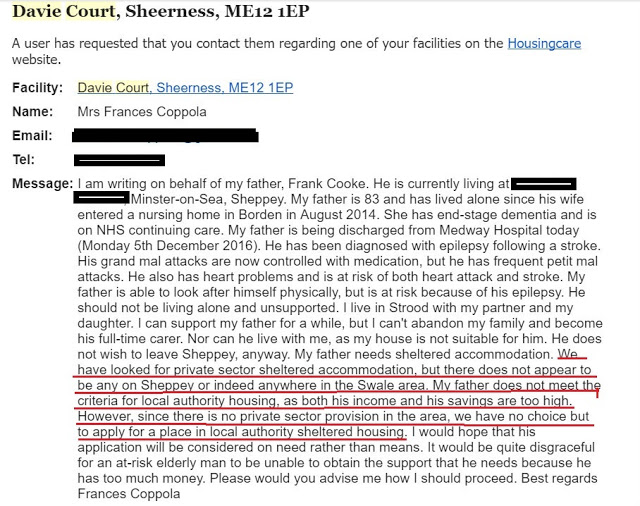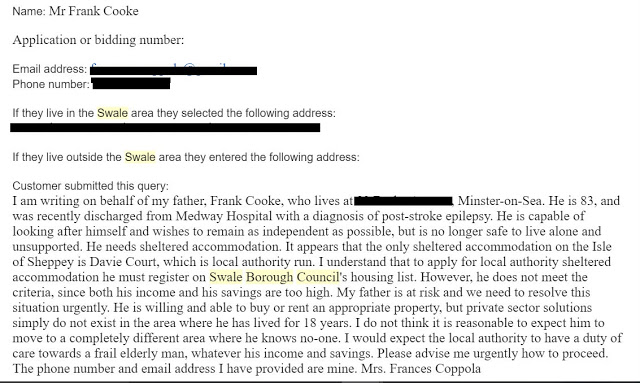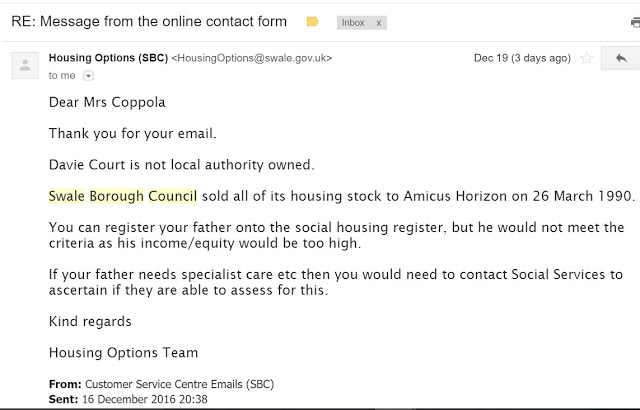Summary:
I hate the term "neoliberal", but in this piece I am going to use it, simply for want of a better word. Neoliberal economic dogma says that the public sector crowds out the private sector. So the public sector should only step in as a last resort to provide for those that the private sector cannot or will not serve. In recent years, we have interpreted this to mean that the public sector should only provide for the very poorest in our society. If people can afford to pay, the private sector will provide. Is this true? Well, true believers say it is. So, if an elderly man with a gold-plated defined benefit pension and substantial savings needs sheltered accommodation because he is no longer safe to live on his own, he should have no problem finding it, should he? I did an internet search for sheltered housing on the Isle of Sheppey, where the elderly man lives. This is what I found: Only one of these enclaves is sheltered housing: the other is accommodation restricted to over-55s, but it does not have an on-site warden. So, for the whole of the Isle of Sheppey (about 38,000 people, of whom around 25% are over 60), there is one sheltered enclave with 38 units, all of which are currently occupied. It is run by Amicus Housing Association on behalf of Swale Borough Council. There is no private sector sheltered housing on Sheppey.
Topics:
Frances Coppola considers the following as important:
This could be interesting, too:
I hate the term "neoliberal", but in this piece I am going to use it, simply for want of a better word.I hate the term "neoliberal", but in this piece I am going to use it, simply for want of a better word. Neoliberal economic dogma says that the public sector crowds out the private sector. So the public sector should only step in as a last resort to provide for those that the private sector cannot or will not serve. In recent years, we have interpreted this to mean that the public sector should only provide for the very poorest in our society. If people can afford to pay, the private sector will provide. Is this true? Well, true believers say it is. So, if an elderly man with a gold-plated defined benefit pension and substantial savings needs sheltered accommodation because he is no longer safe to live on his own, he should have no problem finding it, should he? I did an internet search for sheltered housing on the Isle of Sheppey, where the elderly man lives. This is what I found: Only one of these enclaves is sheltered housing: the other is accommodation restricted to over-55s, but it does not have an on-site warden. So, for the whole of the Isle of Sheppey (about 38,000 people, of whom around 25% are over 60), there is one sheltered enclave with 38 units, all of which are currently occupied. It is run by Amicus Housing Association on behalf of Swale Borough Council. There is no private sector sheltered housing on Sheppey.
Topics:
Frances Coppola considers the following as important:
This could be interesting, too:
Robert Vienneau writes Austrian Capital Theory And Triple-Switching In The Corn-Tractor Model
Mike Norman writes The Accursed Tariffs — NeilW
Mike Norman writes IRS has agreed to share migrants’ tax information with ICE
Mike Norman writes Trump’s “Liberation Day”: Another PR Gag, or Global Reorientation Turning Point? — Simplicius
Neoliberal economic dogma says that the public sector crowds out the private sector. So the public sector should only step in as a last resort to provide for those that the private sector cannot or will not serve. In recent years, we have interpreted this to mean that the public sector should only provide for the very poorest in our society. If people can afford to pay, the private sector will provide.
Is this true? Well, true believers say it is. So, if an elderly man with a gold-plated defined benefit pension and substantial savings needs sheltered accommodation because he is no longer safe to live on his own, he should have no problem finding it, should he?
I did an internet search for sheltered housing on the Isle of Sheppey, where the elderly man lives. This is what I found:
Only one of these enclaves is sheltered housing: the other is accommodation restricted to over-55s, but it does not have an on-site warden. So, for the whole of the Isle of Sheppey (about 38,000 people, of whom around 25% are over 60), there is one sheltered enclave with 38 units, all of which are currently occupied. It is run by Amicus Housing Association on behalf of Swale Borough Council. There is no private sector sheltered housing on Sheppey.
Thinking I might have missed something, I checked with estate agents. They confirmed that there is no private sector sheltered housing on Sheppey. There isn't much in Sittingbourne, either. Better go to Faversham. Or Tunbridge Wells. Richer areas. There is lots there.
The trouble with Sheppey is that it is not an attractive place for private sector providers. Compared not only with the national average but with the county of Kent, it appears to be poor:
Or - is it?
Umm, how does that work, then? Easy. Despite the fact that it is in the South East of England and only about an hour from London by fast commuter train from Sittingbourne, Sheppey's house prices are below the national average. The average house price in England & Wales is currently £216,674, but the average house price on Sheppey is £204,369. Population statistics show that the majority of people on Sheppey are in the 30-59 age bracket, so most of them will have bought their properties some time ago. So the slightly high home ownership rate does not indicate affluence, as the banner at the top of this chart says. Rather, it reflects the affordability of housing on Sheppey relative to the average for the South East - hence the high proportion of mortgages.
And this also explains why there is no private sector sheltered housing, or indeed any private sector accommodation for the elderly other than a couple of care homes. The return on capital is not high enough to justify the property investment. What housebuilding there is on Sheppey is aimed at commuters moving into the area to take advantage of fast road and rail links to London. New housing developments are mostly two and three bedroom homes, plus some larger properties, built close to the roads that take the commuters off the island. I asked one property developer about flats in town centres, and she said "oh we don't do those". They aren't what the commuters want.
So we have a total market failure. The private sector does not provide for the elderly on Sheppey. In fact it doesn't really provide for local people at all. It is entirely focused on attracting London commuters.
Since I couldn't find private sector accommodation, I issued a preliminary enquiry to Amicus Housing Association about Davie Court. (I have redacted personal details, obviously, and added the red underline.)
This was the response:
So, the need of a frail elderly man for sheltered accommodation is treated as a housing problem not a care problem. This is really going well, isn't it?
Swale Borough Council's criteria for housing say absolutely nothing about care needs or risk. But they do say a lot about money:
I knew he wouldn't qualify. He has too much money. But I emailed them anyway, reminding them of their duty of care:
The response was a slapdown:
Translation: ""F**k off. Rich bastards like your father are not our problem".
So, the private sector won't provide, and neither will the public sector. And the third sector has sold out to the public sector. The really stupid thing is that my father is able and willing to pay. But no-one is willing to provide. I am unable to find the sheltered housing that my father needs in the area where he has lived fo 18 years.
And so far, I am unable to find care support either.
Swale Borough Council referred my enquiry to the Social Services department of Kent County Council. But I had already contacted them about care support - and they decided that because my father doesn't need help washing or dressing, he doesn't need any help at all. They interpreted their remit so narrowly that ensuring his safety simply didn't feature.
So I have had to step up myself. I am currently spending several hours at my father's house nearly every day, a round trip of 60 miles, just to ensure that he is safe. And I am permanently on call: he has an assistive helpline, but the first person on the call list is me. I am trying to find support from private sector care agencies: there are a few, though their capacity is limited at present. Maybe, in the new year.....
Fortunately, my working hours are flexible, though my work is suffering: I didn't meet my Forbes mandate last month, I didn't write my Co-Op News column either, I have cancelled numerous singing lessons, and I finally completed my American Express assignments for this year yesterday, one month late. But nevertheless, I am fortunate. Most people do not have such flexible working lives. Many are forced to give up work to care for elderly relatives.
Market failure like this has economic consequences. Government waxes lyrical about the need for affordable childcare so that women with young children can stay in the workforce, while simultaneously cutting back on the services needed to ensure that women with elderly relatives can stay in the workforce. I say women, because the burden of elderly care by families still falls principally on women, though of course some men are carers too. What is the cost to the economy of people leaving the workforce because neither the private nor the public sector will provide adequate care for their elderly relatives?
The next neoliberal cultist who tells me that the public sector should be slashed to the bone to make way for the private sector will receive a very dusty response. Get real, ideologues. The private sector only provides when it perceives that it is in its interests to do so.
Market failures need public sector intervention. Local authorities that only provide for the poorest and fail to ensure that the rest of their constituents have adequate provision are not doing their job. In fact they are breaking the law. The Care Act 2014 specifically assigns to local authorities the responsibility for ensuring that there is a functioning market in social care provision.
The rich in Faversham and Tunbridge Wells are provided for by the private sector. And the poor on Sheppey are provided for by the public sector. But the people in the middle - the in-betweeners - are on their own. No-one is meeting their needs.
Related reading:

